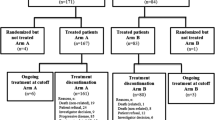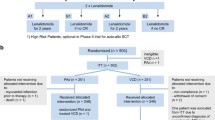Abstract
We previously conducted a phase 1 study of bortezomib, doxorubicin and intermediate-dose dexamethasone (iPAD) therapy and determined the optimal dose of bortezomib to be 1.0 mg/m2. We then conducted a multicenter phase 2 study in patients with relapsed or refractory myeloma. Bortezomib 1.0 mg/m2 was administered intravenously on days 1, 4, 8 and 11, in combination with intravenous doxorubicin 9 mg/m2 on days 1–4, and dexamethasone 20 mg orally on days 1–2, 4–5, 8–9 and 11–12 at a 3-week interval for six cycles. The primary endpoint of this study was the complete remission (CR) rate, and the secondary endpoints were progression-free survival (PFS), overall survival (OS) and toxicity. Twenty-seven patients, median age of 63, were enrolled. An overall response rate was 89 % with CR rate of 30 %. The median PFS time was 12.1 months, and the median OS time was not reached. One patient died of pneumonia. Although the incidence of hematological toxicities was high, these were transient and manageable. The most common non-hematological toxicity was sensory neuropathy; grade 3 toxicity was observed in six patients (22 %) and treatment was discontinued in four. We conclude that iPAD therapy is feasible, and shows efficacy by inducing high response rates and long response duration.

Similar content being viewed by others
References
Adams J. The proteasome: a suitable antineoplastic target. Nat Rev Cancer. 2004;4:349–60.
Hideshima T, Richardson P, Chauhan D, et al. The proteasome inhibitor PS-341 inhibits growth, induces apoptosis, and overcomes drug resistance in human multiple myeloma cells. Cancer Res. 2001;61:3071–6.
Mitsiades N, Mitsiades CS, Richardson PG, et al. The proteasome inhibitor PS-341 potentiates sensitivity of multiple myeloma cells to conventional chemotherapeutic agents: therapeutic applications. Blood. 2003;101:2377–80.
Ma MH, Yang HH, Parker K, et al. The proteasome inhibitor PS-341 markedly enhances sensitivity of multiple myeloma tumor cells to chemotherapeutic agents. Clin Cancer Res. 2003;9:1136–44.
Richardson PG, Sonneveld P, Schuster MW, et al. Bortezomib or high-dose dexamethasone for relapsed multiple myeloma. N Engl J Med. 2005;352:2487–98.
Richardson PG, Sonneveld P, Schuster M, et al. Extended follow-up of a phase 3 trial in relapsed multiple myeloma: final time-to-event results of the APEX trial. Blood. 2007;110:3557–60.
Richardson PG, Barlogie B, Berenson J, et al. A phase 2 study of bortezomib in relapsed, refractory myeloma. N Engl J Med. 2003;348:2609–17.
Jagannath S, Barlogie B, Berenson J, et al. A phase 2 study of two doses of bortezomib in relapsed or refractory myeloma. Br J Haematol. 2004;127:165–72.
Jagannath S, Richardson PG, Barlogie B, et al. Bortezomib in combination with dexamethasone for the treatment of patients with relapsed and/or refractory multiple myeloma with less than optimal response to bortezomib alone. Haematologica. 2006;91:929–34.
Corso A, Varettoni M, Mangiacavalli S, et al. Bortezomib plus dexamethasone is highly effective in relapsed and refractory myeloma patients but responses are short-lived. Eur J Haematol. 2009;83:449–54.
Orlowski RZ, Nagler A, Sonneveld P, et al. Randomized phase III study of pegylated liposomal doxorubicin plus bortezomib compared with bortezomib alone in relapsed or refractory multiple myeloma: combination therapy improves time to progression. J Clin Oncol. 2007;25:3892–901.
Takamatsu Y, Sunami K, Hata H, et al. A phase I study of bortezomib in combination with doxorubicin and intermediate-dose dexamethasone (iPAD therapy) for relapsed or refractory multiple myeloma. Int J Hematol. 2010;92:503–9.
Richardson PG, Briemberg H, Jagannath S, et al. Frequency, characteristics, and reversibility of peripheral neuropathy during treatment of advanced multiple myeloma with bortezomib. J Clin Oncol. 2006;24:3113–20.
Attal M, Harousseau JL, Stoppa AM, et al. A prospective, randomized trial of autologous bone marrow transplantation and chemotherapy in multiple myeloma. N Engl J Med. 1996;335:91–7.
Oakervee HE, Popat R, Curry N, et al. PAD combination therapy (PS-341/bortezomib, doxorubicin and dexamethasone) for previously untreated patients with multiple myeloma. Br J Haematol. 2005;129:755–62.
Palumbo A, Gay F, Bringhen S, et al. Bortezomib, doxorubicin and dexamethasone in advanced multiple myeloma. Ann Oncol. 2008;19:1160–5.
Niesvizky R, Richardson PG, Rajkumar SV, et al. The relationship between quality of response and clinical benefit for patients treated on the bortezomib arm of the international, randomized, phase 3 APEX trial in relapsed multiple myeloma. Br J Haematol. 2008;143:46–53.
Sonneveld P, Schmidt-Wolf IG, van der Holt B, et al. Bortezomib induction and maintenance treatment in patients with newly diagnosed multiple myeloma: results of the randomized phase III HOVON-65/GMMG-HD4 trial. J Clin Oncol. 2012;30:2946–55.
Bringhen S, Larocca A, Rossi D, et al. Efficacy and safety of once-weekly bortezomib in multiple myeloma patients. Blood. 2010;116:4745–53.
Broyl A, Corthals SL, Jongen JL, et al. Mechanisms of peripheral neuropathy associated with bortezomib and vincristine in patients with newly diagnosed multiple myeloma: a prospective analysis of data from the HOVON-65/GMMG-HD4 trial. Lancet Oncol. 2010;11:1057–65.
Kobayashi T, Kuroda J, Shimura K, et al. Bortezomib plus dexamethasone for relapsed or treatment refractory multiple myeloma: the collaborative study at six institutes in Kyoto and Osaka. Int J Hematol. 2010;92:579–86.
Moreau P, Pylypenko H, Grosicki S, et al. Subcutaneous versus intravenous administration of bortezomib in patients with relapsed multiple myeloma: a randomised, phase 3, non-inferiority study. Lancet Oncol. 2011;12:431–40.
Acknowledgments
This clinical study was registered in University hospital Medical Information Network (registration number; UMIN000001210), and was supported by Grant-in-Aid for Scientific Research (23501318) and the non-profit organization of Clinical Hematology/Oncology Treatment Study Group (CHOT-SG). There was no financial disclosure from any authors. We thank project managers Ms. Y. Ito and N. Gushima, and secretaries Ms. E. Kumakawa and N. Ikoma for valuable assistance in conducting the present study, and the medical staff of the following institutions for participating in this study; T. Toyota, Y. Ikari, H. Sasaki, K. Ishitsuka (Fukuoka University), T. Ochi, Y. Meguri, T. Kuroi, J. Konishi (Okayama Medical Center), T. Fujisaki (Matsuyama Red Cross Hospital), N. Nomura, N. Kitamura, H. Yasuyama, J. Tsukada (University of Occupational and Environmental Health), Y. Mori, Y. Abe, T. Teshima (Kyushu University), K. Aoki (Kyushu Kosei-nenkin Hospital), D. Nakamura, M. Yoshimitsu (Kagoshima University), S. Murakami, M. Kugimiya (Kumamoto University), I. Choi, N. Uike (Kyushu Cancer Center), T. Eto, K. Takase, T. Saito (Hamanomachi Hospital), E. Otsuka (Oita Prefectural Hospital), M. Ogata (Oita University), M. Hidaka, T. Sakae (Kumamoto Medical Center), H. Matsuoka (Koga General Hospital), Y. Masaki, M. Miki (Kanazawa Medical University), J. Suzumiya (Shimane University), K. Nagafuji (Kurume University), S. Makino (Toranomon Hospital), and S. Aoki (Niigata University).
Author information
Authors and Affiliations
Consortia
Corresponding author
About this article
Cite this article
Takamatsu, Y., Sunami, K., Muta, T. et al. Bortezomib, doxorubicin and intermediate-dose dexamethasone (iPAD) therapy for relapsed or refractory multiple myeloma: a multicenter phase 2 study. Int J Hematol 98, 179–185 (2013). https://doi.org/10.1007/s12185-013-1389-6
Received:
Revised:
Accepted:
Published:
Issue Date:
DOI: https://doi.org/10.1007/s12185-013-1389-6




